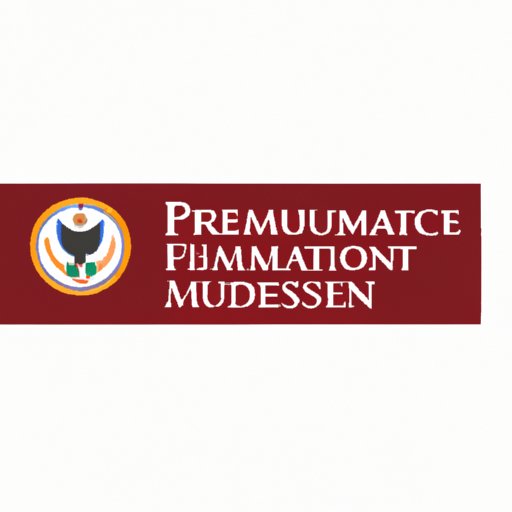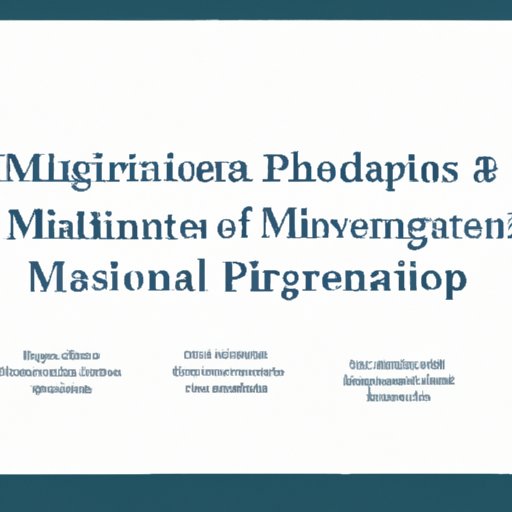
I. Introduction
The Presidential Management Fellowship (PMF) is a competitive, two-year fellowship program that offers recent graduates advanced training, development, and networking opportunities in the federal government. The program is open to talented and diverse individuals who are passionate about public service and leadership and are committed to making a difference in their communities and the nation at large.
With the continuous need for competent public servants in the United States government, the PMF program has grown to become one of the most highly sought-after fellowships in the country. In 2021, over 6,000 applicants submitted applications for the PMF program, and only about 600 were selected to become fellows. Given the competitive nature of the program, it is important for potential applicants to understand the opportunities, requirements, and benefits of participating in this prestigious program.
II. “The Ultimate Guide to Presidential Management Fellowships: All You Need to Know”
PMF is a program that provides recent graduates with the opportunity to work as high-performing, transformative leaders within the federal government. To be eligible for this program, individuals must have completed at least a Master’s or Doctoral degree from an accredited educational institution.
A. Overview of the Program
PMF is a competitive and rigorous two-year fellowship program that is designed to develop a diverse cadre of future federal leaders. Once admitted, fellows participate in a comprehensive, two-year development program that includes an orientation, structured rotations, leadership training, mentoring, and development activities and opportunities.
The fellowship program is not restricted to any particular job or agency within the federal government. Recipients have the unique opportunity to work for the Federal Government agency of their choice to do responsible, meaningful work that is in the public interest, while being provided with structured, yet customized developmental support.
B. Eligibility Criteria for the Program
To become a Presidential Management Fellow, individuals must be U.S. citizens, have completed or be in the final stages of completing a graduate or professional degree from an accredited educational institution, and meet certain other talent management eligibility requirements.
In addition, PMF applicants must demonstrate exceptional analytical, communication, and leadership skills, and a commitment to public service, among other qualities. Upon selection, applicants are admitted for two years of intensive training and development activities.
C. Steps to Apply for the Program
The selection process for the PMF program is highly competitive and rigorous. It includes a multi-stage application process, including a comprehensive application, an assessment center, and a final interview. Potential applicants are encouraged to begin exploring the program and preparing their applications early to ensure they have enough time to craft and present a strong application.
D. Program Timeline and Activities
The PMF program runs on an annual cycle, with the application period typically opening in September or October and closing in November or December. The program timeline and activities are structured as follows:
- Application period (Sept-Nov)
- Semifinalist announcement (Jan-Feb)
- Assessment Center (Feb-Mar)
- Finalist announcement (Apr-May)
- Orientation and agency placement (June-Sept)
- Two-year rotation and development program (Sept-Aug)
E. Benefits of Participating in the Program
The PMF program provides several benefits to participants, including:
- Access to federal agencies and high-level government roles
- Accelerated career progression within the federal government for successful candidates
- Specialized, structured leadership development opportunities and training
- The opportunity to build wide-ranging networks and relationships with peers, mentors, and sponsors within federal agencies, Congress, and the private sector
- Job security and competitive compensation packages that include bonuses and other benefits
III. Unpacking the Prestige and Promise of Presidential Management Fellowships
A. Importance of the Program in the Federal Government
The PMF program is highly valued in the federal government and is seen as an important pipeline for developing future federal leaders. The program has been instrumental in exposing promising young leaders to the inner workings of the federal government, promoting diversity in the workplace, and creating meaningful, research-based partnerships between academia and the federal government.
The PMF program also provides incredible value to federal agencies, which are able to bring in top talent and develop future leaders through the program’s intensive development opportunities. PMF participants receive hands-on exposure to many different aspects of federal operations and policy-making and gain valuable experience which they can apply in both public and other sectors.
B. The Impact of the Program on Public Service
PMFs are highly coveted by federal agencies because they add new talent and critical skills to the workforce, and they serve as exceptional leaders and problem-solvers. PMFs bring unique perspectives and diverse backgrounds to the federal government that can be invaluable when solving complex problems and representing the interests of the public. PMFs are also effective in building relationships between government and the public, and helping organizations develop new policies and programs.
C. Benefits of Being a Presidential Management Fellow
One of the benefits of being a PMF is the access one gains to top-level government officials, key stakeholders, and other PMFs in various employee groups. These relationships can last long after the PMF program has ended, providing invaluable networking and development opportunities that can pay benefits throughout the PMF’s career.
In addition, PMFs get paid well, often more than other professionals in their field. They also get hands-on experience implementing policies, managing programs, and working on complex issues, as well as the opportunity to provide input on national policies and activities.
D. Alumni Success Stories and Testimonials
Many PMFs have gone on to become highly successful in their chosen fields. In 2020, over 85% of former PMFs continued to work for the federal government after completing the PMF program, with many serving in high-level leadership positions.
For example, Adam Neufeld, a former PMF, was recently named Deputy Administrator for the National Highway Traffic Safety Administration (NHTSA), where he is responsible for overseeing the agency’s research programs, identifying emerging technologies and trends, and executing agency policy objectives.
Such success stories show just how impactful the PMF program can be and highlight the vital role of PMFs in shaping the future of federal leadership.

IV. Navigating the Presidential Management Fellowship Application Process: Tips and Strategies
A. Brief Overview of the Application Process
The PMF application process is a multi-step, competitive process that requires applicants to meet the eligibility requirements of the program, submit a complete application package, and undergo a rigorous assessment process. The application process typically includes an assessment center, as well as a final interview.
B. Strategies to Craft a Strong Application
Applicants should approach the PMF application process with a strategic mindset. To create the best possible application, they should dedicate enough time and effort to prepare and craft their application materials, including their resume, transcripts, narratives, and essays. They should also pay close attention to how they present their skills, experiences, and accomplishments.
C. Tips on Writing a Successful Essay
The PMF essay is an important component of the application process and should be carefully crafted. Applicants should use their essay to showcase their writing ability, express their unique qualities, and demonstrate their qualifications for the PMF program. They should use examples from their experiences and background to illustrate their strengths and potential value to the federal government.
D. Common Mistakes to Avoid in the Application
There are many common mistakes that applicants make during the PMF application process. Some of these mistakes include failing to meet eligibility requirements, poor essay writing, failing to follow application instructions, failing to demonstrate why they are a good fit for the PMF program, and failing to put their best foot forward throughout the application process.
V. From Aspiring Leaders to Public Servants: The Impact of the Presidential Management Fellowship
A. Discussion of the Role of PMFs in the Federal Government
PMFs play an important and multifaceted role in federal government operations. They bring new perspectives and diverse backgrounds to an organization, add additional skills and talent, and serve as exceptional leaders and problem-solvers who have the ability to impact policy and programs at all levels of government.
B. Stories of PMFs Who Have Made a Difference
There are countless examples of PMFs who have made a significant impact in their roles within the federal government. For example, Karen Aldana, a 2015 PMF, served as the Deputy Chief of Staff for the Environmental Protection Agency (EPA), where she worked closely with senior officials and agency leadership to develop and implement policy initiatives.
Another example is Carrie Kline, a former PMF who works for the Department of Homeland Security (DHS). Kline has said that her PMF experience helped her to be better prepared to work in the federal government. “I have a better understanding of the way pieces fit together, how decisions are made, and how to communicate effectively in a very complex, fast-paced environment,” she said.
C. The Role of PMFs in Public Service and Leadership
PMFs serve as leaders and changemakers within the federal government, working to make a difference in their communities and the nation at large. They bring new perspectives and a unique skillset to the field, and they have the ability to influence the direction of policy and program development across agencies and departments. PMFs are also committed to serving the public good and embodying the principles of public service in all their work.
VI. Get Ahead with a Presidential Management Fellowship: Career Benefits and Advantages
A. Overview of Career Benefits of Participating in the Program
The PMF program provides a variety of benefits to participants, including the ability to gain incredible experience and skills in the federal government. PMFs often get exposure to various federal agencies and departments, they work on complex issues, and they gain experience developing policy and programs that serve the nation at large.
B. Opportunities for Professional Growth and Advancement
PMFs who participate in the program often see incredible growth and advancement opportunities within the federal government. These opportunities can manifest as promotions, job mobility, wage increases, and access to valuable training and leadership development programs.
C. Potential Career Tracks for PMFs
PMFs who participate in the program often have the ability to pursue a wide range of careers within the federal government. These career tracks can be highly diverse and may include opportunities in policy development, program management, public affairs, or interagency collaboration. PMFs may also pursue careers in academia, business, or other sectors, applying the skills and experiences they have learned through the PMF program.
D. Access to Networks and Resources for Career Success
PMFs have access to valuable networks and resources that can serve them well throughout their careers. PMFs can connect with other young professionals, experienced senior staff, and other thought leaders in the field, gaining access to mentorship, collaborative opportunities, and other support and guidance that can help them advance their careers.




